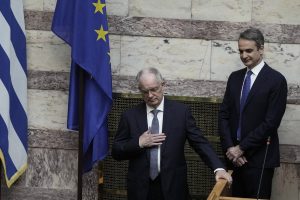Gunmen clash in a Libyan city and fires erupt at a nearby oil refinery
CAIRO (AP) — Clashes broke out Sunday between armed groups in a western Libyan city, trapping residents in their homes and causing fires in the country’s second largest oil refinery, officials said.
The fighting in the coastal city of Zawiya, about 47 kilometers (about 30 miles) west of capital Tripoli, pitted gunmen loyal to the Shurafaa tribe against warlord Mohamed Kushlaf, according to local media. Kushalf was sanctioned by the U.N. Security Council in 2018 for his alleged involvement in human trafficking.
It wasn’t immediately clear what triggered the clashes but they are not uncommon in western Libya, which is controlled by an array of lawless militias and armed groups allied with Prime Minister Abdul Hamid Dbeibah’s government.
Advertisement
Oil-rich Libya has been divided for years between rival administrations in the east and west. It plunged into chaos following the 2011 uprising-turned-civil war, which toppled and later killed longtime dictator Moammar Gadhafi. Amid the chaos, militias grew in wealth and power, particularly in Tripoli and the western part of the country.
The fighting Sunday closed a major coastal road linking Zawiya to other cities in western Libya and classes were suspended.
“Many families are trapped in their homes. Bullets are being fired indiscriminately, hitting houses and buildings,” resident Ahmed Abu Hussein said by phone. He said the the fighting occurred in multiple areas across the city, including densely populated quarters, causing panic and terror among civilians.
The clashes also caused “severe damage” to storage tanks in the Zawiya oil refinery, the Libyan National Oil Corp. said.
Bullets hit oil tanks, leading to “dangerous” fires, it said, adding that firefighters managed to control the fires and gas leakage as clashes raged around the refinery.
Advertisement
The company, which runs Libya’s oil industry, declared emergency and force majeure, a legal maneuver that releases it of its contractual obligations because of extraordinary circumstances.
In August, clashes between two heavily armed militias in Tripoli killed at least nine people and wounded 16 others.
Libya is currently governed by Dbeibah’s government in Tripoli and by the administration of Prime Minister Ossama Hammad in the east, which is allied with forces of powerful military commander Khalifa Hifter.
Samy Magdy, The Associated Press

